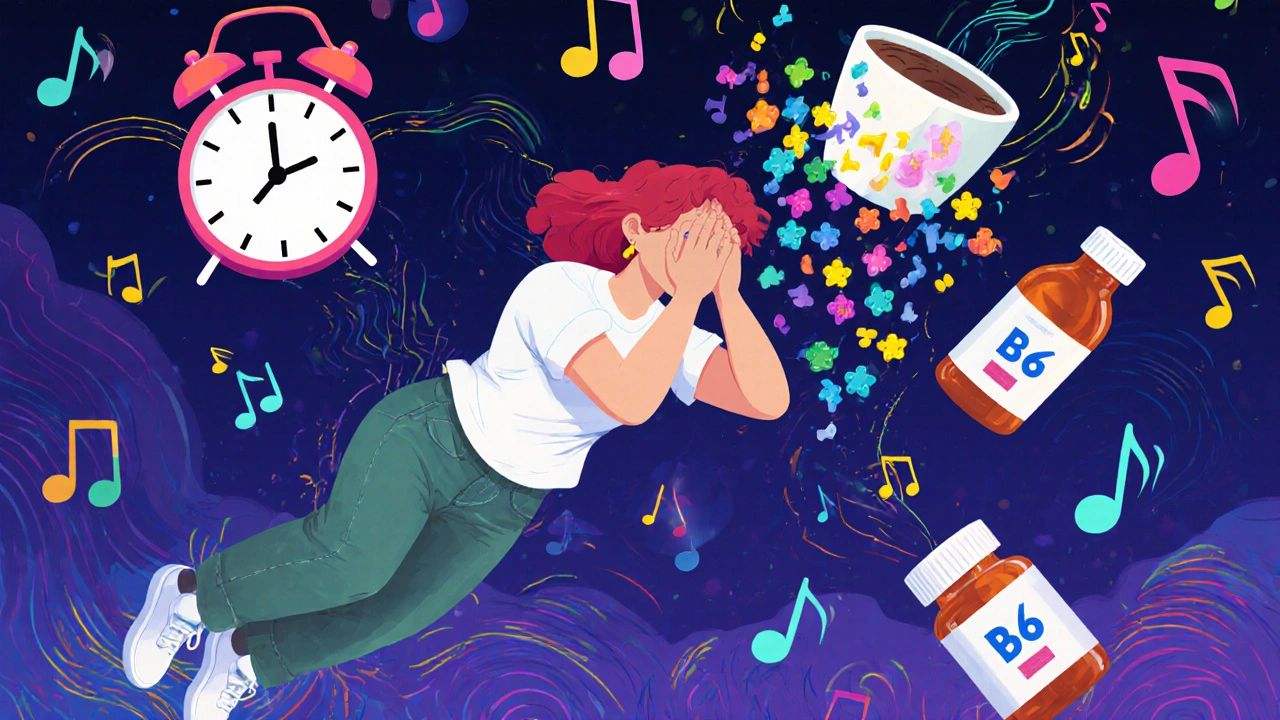Most people think of vitamin B6 as just another pill in the multivitamin bottle. But if you’re feeling tired all the time, moody, forgetful, or struggling with sleep, your body might be screaming for more of it. Vitamin B6 isn’t just a supplement-it’s a key player in over 150 enzyme reactions that keep your brain, nerves, and metabolism running smoothly. And unlike flashy new supplements, this one’s been quietly working behind the scenes for decades.
What Vitamin B6 Actually Does in Your Body
Vitamin B6, also called pyridoxine, isn’t just one thing-it’s a group of compounds that your body turns into its active form, pyridoxal phosphate. Think of it like a master switch that turns on critical processes. It helps make neurotransmitters like serotonin and dopamine, which control your mood and motivation. It also helps turn food into energy, build red blood cells, and regulate your immune system. Without enough B6, your brain can’t send signals properly. Your body can’t make hemoglobin. Your immune response slows down. And you start feeling off-not sick enough to see a doctor, but not quite right either.
Here’s the thing: vitamin B6 doesn’t sit around. Your body uses it fast. If you’re stressed, exercising hard, drinking alcohol regularly, or taking certain medications like birth control pills or metformin, you’re burning through it faster than most people realize. And because your body doesn’t store it like fat-soluble vitamins, you need a fresh supply every single day.
How Low B6 Affects Your Brain and Mood
Low vitamin B6 levels are strongly linked to depression, anxiety, and brain fog. A 2023 study in the Journal of Affective Disorders found that adults with the lowest B6 levels were 30% more likely to report moderate to severe depressive symptoms. Why? Because B6 is needed to turn tryptophan into serotonin-the chemical that makes you feel calm and content. No B6? No serotonin. No serotonin? You feel stuck in a low mood, even if nothing in your life has changed.
It’s not just mood. Memory and focus take a hit too. Older adults with low B6 show faster cognitive decline. In one trial, seniors who took 20 mg of B6 daily for a year had better memory recall than those who didn’t. That’s not magic-it’s biochemistry. B6 helps reduce homocysteine, a toxic amino acid that builds up when you’re deficient. High homocysteine is linked to brain shrinkage and Alzheimer’s risk. Keep B6 levels up, and you’re protecting your brain from slow damage.
Energy, Sleep, and Immunity: The Hidden Roles
Feeling constantly drained? It might not be lack of sleep-it could be low B6. This vitamin helps convert glycogen into glucose, your body’s main fuel. If you’re running on empty, even after a full night’s rest, your B6 might be dragging. Athletes, shift workers, and busy parents often don’t realize their fatigue is tied to nutrient gaps, not just busyness.
And then there’s sleep. B6 helps your body make melatonin, the hormone that tells you it’s time to sleep. People who struggle with insomnia often have low B6 levels. One small study showed that taking 100 mg of B6 before bed improved sleep quality in 80% of participants-without the grogginess you get from sleeping pills.
Immunity? Also tied to B6. It helps create antibodies and T-cells that fight off viruses and bacteria. A 2022 review in Nutrients found that older adults with low B6 had weaker responses to vaccines. That means even if you get your flu shot, your body might not respond well if you’re deficient.

Who’s Most at Risk for Deficiency?
It’s not just the elderly. Many young adults are low in B6 without knowing it. Here are the top groups at risk:
- People on long-term proton pump inhibitors (like omeprazole) for heartburn
- Those taking oral contraceptives or hormone replacement therapy
- People with kidney disease or autoimmune disorders like rheumatoid arthritis
- Heavy drinkers (alcohol blocks B6 absorption)
- Vegetarians and vegans who don’t eat enough fortified foods or legumes
- Anyone with poor digestion or gut issues like IBS or Crohn’s
And here’s a surprise: even people who eat well can be deficient. Modern farming has reduced B6 levels in soil, so even fresh foods may not contain what they used to. Plus, cooking destroys some of it-boiling vegetables can wipe out up to 50% of the B6 content.
Food Sources That Actually Work
You don’t need pills if you eat the right foods. Here are the top natural sources of vitamin B6, ranked by amount per serving:
| Food | B6 Content (mg) | Approx. Daily Needs Met |
|---|---|---|
| Chickpeas (cooked) | 1.1 | 85% |
| Salmon (cooked) | 0.8 | 62% |
| Chicken breast (cooked) | 0.6 | 46% |
| Avocado | 0.3 | 23% |
| Banana | 0.4 | 31% |
| Potatoes (with skin) | 0.3 | 23% |
| Spinach (cooked) | 0.2 | 15% |
The daily recommended intake is 1.3 mg for adults under 50, rising to 1.5-1.7 mg after 50. One cup of chickpeas gives you more than your daily need. A 150g serving of salmon hits nearly two-thirds. That’s not hard to get if you eat real food.
When to Consider a Supplement
Food should be your first line of defense. But if you’re in one of the high-risk groups-or you’ve had blood work showing low levels-a supplement can help. Most over-the-counter B6 supplements are 10-50 mg. That’s safe for most people. The upper limit is 100 mg per day from supplements (not food), beyond which nerve damage can occur. But you’d need to take 500 mg daily for months to reach that point. So, 25-50 mg a day is a smart, safe dose if you’re deficient.
Look for supplements with pyridoxal-5-phosphate (P5P). That’s the active form your body uses directly. Regular pyridoxine needs to be converted, and some people-especially older adults or those with liver issues-can’t do that well. P5P skips the middleman.

What Not to Do
Don’t take B6 without checking your levels if you’re on long-term medication. Don’t assume you’re fine just because you eat meat. Don’t take mega-doses (500+ mg) hoping for a miracle. That doesn’t work-and it can hurt. B6 isn’t a quick fix. It’s a foundation. You won’t feel better overnight. But after 4-6 weeks of consistent intake, people report clearer thinking, better sleep, and less irritability.
And don’t ignore the root cause. If you’re low in B6 because of gut problems or chronic stress, fixing your diet alone won’t be enough. Talk to a doctor. Get tested. Address the underlying issue.
Real-Life Impact: What People Report
One Melbourne mum, 38, started taking 25 mg of P5P after months of brain fog and afternoon crashes. She stopped drinking coffee after lunch. Within three weeks, she was falling asleep faster and waking up without hitting snooze. "I didn’t realize how much my mood had been dragging," she said. "It’s like my brain finally caught up with my body."
A 62-year-old retired teacher in Geelong started supplementing after her doctor flagged low B6 on a routine blood test. She’d been forgetting names, feeling anxious, and losing her appetite. After two months, her memory improved. Her doctor noticed her homocysteine levels dropped by 28%. She’s now eating more chickpeas and salmon-and feeling like herself again.
This isn’t anecdotal. It’s biochemistry. When you give your body the right fuel, it works the way it’s supposed to.
Can you get too much vitamin B6 from food?
No. You cannot overdose on vitamin B6 from food alone. Even eating large amounts of chickpeas, salmon, or bananas won’t push you past safe limits. The risk of toxicity only comes from high-dose supplements-usually over 500 mg daily for months. Stick to food first, and only use supplements if recommended by a healthcare provider.
How long does it take to see results from vitamin B6?
Most people notice improvements in energy, sleep, or mood within 2-4 weeks. For brain-related benefits like memory or focus, it can take 6-8 weeks. Consistency matters more than dose. Taking 25 mg daily is more effective than taking 100 mg once a week.
Does vitamin B6 help with PMS or morning sickness?
Yes. Studies show that 25-50 mg of B6 daily can reduce nausea during pregnancy and ease PMS symptoms like mood swings and bloating. It’s one of the few supplements with strong evidence for both. Always check with your doctor before taking supplements during pregnancy.
Can vitamin B6 interact with medications?
Yes. B6 can reduce the effectiveness of levodopa (used for Parkinson’s) and interact with certain seizure medications like phenytoin. It may also increase the risk of side effects with some antibiotics and blood pressure drugs. Always tell your doctor what supplements you’re taking.
Is B6 the same as B12?
No. Vitamin B6 and B12 are different nutrients with different roles. B12 is critical for nerve function and red blood cell production. B6 helps make neurotransmitters and metabolize amino acids. You can be low in one and not the other. They often work together, but they’re not interchangeable.
Next Steps: What to Do Today
Start simple. Add one B6-rich food to your meals today. Try roasted chickpeas as a snack. Swap your lunch sandwich for grilled salmon. Add avocado to your salad. Eat a banana with your morning coffee. That’s it.
If you’re still feeling off after a few weeks, get your blood tested. Ask your doctor for a serum pyridoxal phosphate test-the most accurate marker of B6 status. Don’t rely on a general vitamin panel; most don’t test for B6.
This isn’t about taking more pills. It’s about giving your body what it’s been asking for. Vitamin B6 doesn’t promise miracles. But when you’re missing it, your brain, your mood, and your energy pay the price. Fix that gap-and you might just feel like yourself again.

Victoria Malloy
I started taking 25mg of P5P last month after reading this, and honestly? I didn’t think it would do much. But my afternoon crashes are gone, and I’m sleeping through the night without alarms. No caffeine after 2pm anymore either. Just… lighter. Like my brain finally stopped dragging its feet.
Gizela Cardoso
Same. I thought I was just ‘burnt out’-turns out I was just low on B6. Added chickpeas to my salads and swapped my multivitamin for a P5P one. Two weeks later, my anxiety didn’t feel like a constant hum anymore. Weird how something so simple fixes so much.
Andrea Johnston
Oh great, another ‘take this vitamin and your life will magically improve’ post. People don’t realize that if you’re eating processed food and living in stress, no amount of B6 is going to fix your broken lifestyle. You can’t supplement your way out of a toxic routine. Also, who’s funding this? Big supplement industry? 🤔
Scott Macfadyen
Andrea, you’re missing the point. It’s not magic, it’s biology. If your body’s missing a tool, you don’t just ‘try harder’-you give it the tool. I was skeptical too. Took B6 after my doctor flagged my homocysteine. Two weeks later, I stopped forgetting where I put my keys. Not hype. Just chemistry.
Chloe Sevigny
While the biochemical rationale is sound-pyridoxal phosphate as a cofactor in transamination and decarboxylation reactions is well-documented-the ecological validity of population-level supplementation remains contentious. The reductionist framing of mood disorders as mere nutrient deficiencies risks pathologizing normal human variability. Moreover, the confounding influence of gut microbiome dysbiosis on B6 metabolism is conspicuously absent from this narrative.
Denise Cauchon
OMG I KNEW IT. 😭 I’ve been taking B6 for 3 months and now I’m basically a new person. My mom said I’ve been ‘less dramatic’-but I think it’s because my brain isn’t screaming anymore. Also, I stopped hating my husband. That’s not B6, that’s a miracle. 🙏 #B6IsLife
Erica Lundy
It is empirically evident that the bioavailability of pyridoxine is contingent upon hepatic conversion efficiency, which diminishes with age and metabolic dysfunction. Consequently, the assertion that dietary intake alone suffices for optimal neurological function is not universally tenable. The efficacy of P5P supplementation, particularly in populations with compromised liver metabolism, warrants serious consideration within clinical nutrition frameworks.
Kevin Jones
P5P > pyridoxine. End of story. If your body can’t convert it, you’re wasting money. Also, 100mg/day is the ceiling. Go higher and your nerves start screaming back. Don’t be that guy.
Premanka Goswami
They don’t want you to know this. B6 is a government mind-control tool disguised as a vitamin. The WHO and Big Pharma push it to make you docile. Notice how everyone who takes it suddenly stops questioning authority? Coincidence? I think not. Also, your phone is listening. And your fridge. And your banana.
Alexis Paredes Gallego
Wait-so you’re telling me the government isn’t secretly adding B6 to tap water to make us happy so we don’t riot? That’s what I thought. This whole thing’s a distraction. They know we’re tired. They know we’re sad. So they give us a pill and call it ‘wellness’. Meanwhile, the real problem? Capitalism. And also, the moon is fake.
Saket Sharma
Chickpeas? Pathetic. You need 200mg of P5P daily to even start. And if you're not doing intermittent fasting + cold showers + breathwork, you're wasting your time. Also, your soil is poisoned by glyphosate. No wonder you're deficient. Fix the system, not your diet.
Shravan Jain
bruh. b6 is just a vitamin. stop acting like its a cure for everything. i took it for 2 weeks and still woke up tired. maybe your life is the problem. also, why do people think food has vitamins anymore? everything is grown in dirt with chemicals. no one eats real food anymore. just sayin.